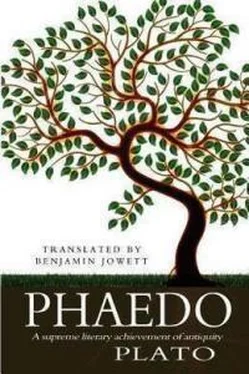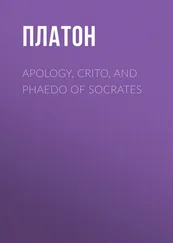Платон - Phaedo
Здесь есть возможность читать онлайн «Платон - Phaedo» весь текст электронной книги совершенно бесплатно (целиком полную версию без сокращений). В некоторых случаях можно слушать аудио, скачать через торрент в формате fb2 и присутствует краткое содержание. Год выпуска: 2014, Издательство: epubBooks Classics, Жанр: Философия, на английском языке. Описание произведения, (предисловие) а так же отзывы посетителей доступны на портале библиотеки ЛибКат.
- Название:Phaedo
- Автор:
- Издательство:epubBooks Classics
- Жанр:
- Год:2014
- ISBN:нет данных
- Рейтинг книги:3 / 5. Голосов: 1
-
Избранное:Добавить в избранное
- Отзывы:
-
Ваша оценка:
- 60
- 1
- 2
- 3
- 4
- 5
Phaedo: краткое содержание, описание и аннотация
Предлагаем к чтению аннотацию, описание, краткое содержание или предисловие (зависит от того, что написал сам автор книги «Phaedo»). Если вы не нашли необходимую информацию о книге — напишите в комментариях, мы постараемся отыскать её.
Phaedo — читать онлайн бесплатно полную книгу (весь текст) целиком
Ниже представлен текст книги, разбитый по страницам. Система сохранения места последней прочитанной страницы, позволяет с удобством читать онлайн бесплатно книгу «Phaedo», без необходимости каждый раз заново искать на чём Вы остановились. Поставьте закладку, и сможете в любой момент перейти на страницу, на которой закончили чтение.
Интервал:
Закладка:
Such appears to be the case.
Yet the exchange of one fear or pleasure or pain for another fear or pleasure or pain, and of the greater for the less, as if they were coins, is not the exchange of virtue. O my blessed Simmias, is there not one true coin for which all things ought to be exchanged?—and that is wisdom; and only in exchange for this, and in company with this, is anything truly bought or sold, whether courage or temperance or justice. And is not all true virtue the companion of wisdom, no matter what fears or pleasures or other similar goods or evils may or may not attend her? But the virtue which is made up of these goods, when they are severed from wisdom and exchanged with one another, is a shadow of virtue only, nor is there any freedom or health or truth in her; but in the true exchange there is a purging away of all these things, and temperance, and justice, and courage, and wisdom herself are the purgation of them. The founders of the mysteries would appear to have had a real meaning, and were not talking nonsense when they intimated in a figure long ago that he who passes unsanctified and uninitiated into the world below will lie in a slough, but that he who arrives there after initiation and purification will dwell with the gods. For 'many,' as they say in the mysteries, 'are the thyrsus–bearers, but few are the mystics,'—meaning, as I interpret the words, 'the true philosophers.' In the number of whom, during my whole life, I have been seeking, according to my ability, to find a place;—whether I have sought in a right way or not, and whether I have succeeded or not, I shall truly know in a little while, if God will, when I myself arrive in the other world—such is my belief. And therefore I maintain that I am right, Simmias and Cebes, in not grieving or repining at parting from you and my masters in this world, for I believe that I shall equally find good masters and friends in another world. But most men do not believe this saying; if then I succeed in convincing you by my defence better than I did the Athenian judges, it will be well.
Cebes answered: I agree, Socrates, in the greater part of what you say. But in what concerns the soul, men are apt to be incredulous; they fear that when she has left the body her place may be nowhere, and that on the very day of death she may perish and come to an end—immediately on her release from the body, issuing forth dispersed like smoke or air and in her flight vanishing away into nothingness. If she could only be collected into herself after she has obtained release from the evils of which you are speaking, there would be good reason to hope, Socrates, that what you say is true. But surely it requires a great deal of argument and many proofs to show that when the man is dead his soul yet exists, and has any force or intelligence.
True, Cebes, said Socrates; and shall I suggest that we converse a little of the probabilities of these things?
I am sure, said Cebes, that I should greatly like to know your opinion about them.
I reckon, said Socrates, that no one who heard me now, not even if he were one of my old enemies, the Comic poets, could accuse me of idle talking about matters in which I have no concern:—If you please, then, we will proceed with the inquiry.
Suppose we consider the question whether the souls of men after death are or are not in the world below. There comes into my mind an ancient doctrine which affirms that they go from hence into the other world, and returning hither, are born again from the dead. Now if it be true that the living come from the dead, then our souls must exist in the other world, for if not, how could they have been born again? And this would be conclusive, if there were any real evidence that the living are only born from the dead; but if this is not so, then other arguments will have to be adduced.
Very true, replied Cebes.
Then let us consider the whole question, not in relation to man only, but in relation to animals generally, and to plants, and to everything of which there is generation, and the proof will be easier. Are not all things which have opposites generated out of their opposites? I mean such things as good and evil, just and unjust—and there are innumerable other opposites which are generated out of opposites. And I want to show that in all opposites there is of necessity a similar alternation; I mean to say, for example, that anything which becomes greater must become greater after being less.
True.
And that which becomes less must have been once greater and then have become less.
Yes.
And the weaker is generated from the stronger, and the swifter from the slower.
Very true.
And the worse is from the better, and the more just is from the more unjust.
Of course.
And is this true of all opposites? and are we convinced that all of them are generated out of opposites?
Yes.
And in this universal opposition of all things, are there not also two intermediate processes which are ever going on, from one to the other opposite, and back again; where there is a greater and a less there is also an intermediate process of increase and diminution, and that which grows is said to wax, and that which decays to wane?
Yes, he said.
And there are many other processes, such as division and composition, cooling and heating, which equally involve a passage into and out of one another. And this necessarily holds of all opposites, even though not always expressed in words—they are really generated out of one another, and there is a passing or process from one to the other of them?
Very true, he replied.
Well, and is there not an opposite of life, as sleep is the opposite of waking?
True, he said.
And what is it?
Death, he answered.
And these, if they are opposites, are generated the one from the other, and have there their two intermediate processes also?
Of course.
Now, said Socrates, I will analyze one of the two pairs of opposites which I have mentioned to you, and also its intermediate processes, and you shall analyze the other to me. One of them I term sleep, the other waking. The state of sleep is opposed to the state of waking, and out of sleeping waking is generated, and out of waking, sleeping; and the process of generation is in the one case falling asleep, and in the other waking up. Do you agree?
I entirely agree.
Then, suppose that you analyze life and death to me in the same manner. Is not death opposed to life?
Yes.
And they are generated one from the other?
Yes.
What is generated from the living?
The dead.
And what from the dead?
I can only say in answer—the living.
Then the living, whether things or persons, Cebes, are generated from the dead?
That is clear, he replied.
Then the inference is that our souls exist in the world below?
That is true.
And one of the two processes or generations is visible—for surely the act of dying is visible?
Surely, he said.
What then is to be the result? Shall we exclude the opposite process? And shall we suppose nature to walk on one leg only? Must we not rather assign to death some corresponding process of generation?
Certainly, he replied.
And what is that process?
Return to life.
And return to life, if there be such a thing, is the birth of the dead into the world of the living?
Quite true.
Then here is a new way by which we arrive at the conclusion that the living come from the dead, just as the dead come from the living; and this, if true, affords a most certain proof that the souls of the dead exist in some place out of which they come again.
Yes, Socrates, he said; the conclusion seems to flow necessarily out of our previous admissions.
And that these admissions were not unfair, Cebes, he said, may be shown, I think, as follows: If generation were in a straight line only, and there were no compensation or circle in nature, no turn or return of elements into their opposites, then you know that all things would at last have the same form and pass into the same state, and there would be no more generation of them.
Читать дальшеИнтервал:
Закладка:
Похожие книги на «Phaedo»
Представляем Вашему вниманию похожие книги на «Phaedo» списком для выбора. Мы отобрали схожую по названию и смыслу литературу в надежде предоставить читателям больше вариантов отыскать новые, интересные, ещё непрочитанные произведения.
Обсуждение, отзывы о книге «Phaedo» и просто собственные мнения читателей. Оставьте ваши комментарии, напишите, что Вы думаете о произведении, его смысле или главных героях. Укажите что конкретно понравилось, а что нет, и почему Вы так считаете.










